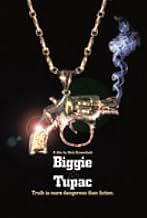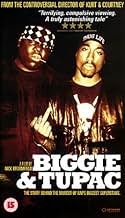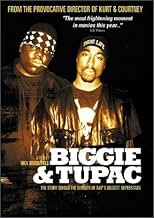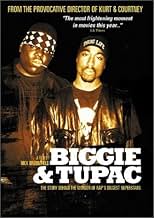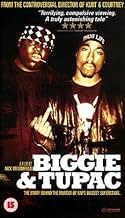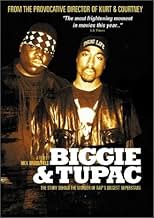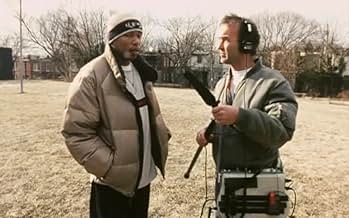Biggie & Tupac est une enquête sans restriction sur les meurtres encore non résolus des deux plus grandes superstars que le rap ait jamais produites; Christopher Wallace, alias Biggie Smalls... Tout lireBiggie & Tupac est une enquête sans restriction sur les meurtres encore non résolus des deux plus grandes superstars que le rap ait jamais produites; Christopher Wallace, alias Biggie Smalls, et Tupac Shakur.Biggie & Tupac est une enquête sans restriction sur les meurtres encore non résolus des deux plus grandes superstars que le rap ait jamais produites; Christopher Wallace, alias Biggie Smalls, et Tupac Shakur.
- Récompenses
- 1 nomination au total
- Self
- (images d'archives)
- Self
- (images d'archives)
Avis à la une
Brilliant film, but very sad how Biggie got dragged into it to make it look like it was the East Coast beef that got 2pac killed. When in fact it was Suge and his crooked cops.
Nick does lots of research in this movie, more than ever has been covered before. People with neutral thoughts on Rap music and Violence even will love this documentary.
A MUST see.
Broomfield has had good documentaries and bad documentaries, this is one of his best efforts and is actually very good work and may help the actual investigation. The basic story sees Broomfield stumbling into various interviews as a sort of wide-eyed innocent. His style can be a little annoying at times and also his voice is quite monotonous but his material is griping.
From the one officer that starts his trail, Broomfield uncovers lot of insightful stuff that shows a much bigger picture that has not been publically seen before. For example the FBI were trailing Biggie and Puffy hours before they got killed and had been for quite some time so where were they when they got shot? Asks Lil' Caese why didn't they at least catch the gunman? The conspiracy Broomfield puts forward is quite extreme but the evidence and the witnesses are there at every stage to back it up. By the time Knight is interviewed the case is pretty much made.
The film makes very good use of old footage including the East/West kick-off at an awards ceremony and old footage of Tupac in the studio and Biggie rapping live at outdoor shows. The atcual interviews are all good and mostly very illuminating. Knight is quite intimidating but is clearly putting on a face. Lil' Caese is helpful as are many of the bodyguards and cops but the best interviews are with Biggie's mum she doesn't have many facts but she really helps Biggie be a real person rather than just a larger than life rapper. The gaps are as prominent as the people why no Puffy, why no Snoop, why no Faith Evans etc. However those that are involved all provide a lot of information.
The music is good throughout (if you're into hip-hop) but can someone tell me why Gangstarr were used several times in favour of the artist's own stuff?
Overall this is a must see for all hip-hop fans, but it is also a good view for those who like conspiracy theories. Broomfield's style is a little annoying but the pace and depth of the material is gripping and makes for very, very interesting viewing.
*** 1/2 (out of 4)
Nick Bloomfield is someone you could call a controversial filmmaker because his documentaries are usually attacked by people for a number of reasons. His style is also something that rubs a few people the wrong way and both of those things are on hand here in this documentary that takes a look at the murders of Tupac Shakur and The Notorious BIG. This documentary takes a look at their murders, what connection they might have to each other and what role the LAPD might have played in them.
BIGGIE AND TUPAC isn't done in the sleazy style as the director's KURT AND COURTNEY but it's certainly just as entertaining. It seems that these murders may eventually go down in history as giant mysteries but there's no question that Bloomfield tries to get to the bottom of them. This includes him going into rather bad areas to interview people and his questions are also to the point where he challenges people to answer. Considering how shady some of these people are, when you watch Bloomfield press them you can't help but feel a little tension.
The biggest thing here is that Bloomfield manages to interview Russell Poole, the LAPD Detective who basically accused the department of a major cover up and accused several people of being involved in the murder. He is interviewed here and discusses various bits of information as it applies to the murders. There's no question that his stuff is some of the best here but we also get interviews with several people who knew Tupac as well as Christopher Wallace. Wallace's own mother is also on hand here being interviewed.
BIGGIE AND TUPAC shines a light on many of the conspiracy theories out there so it's interesting to see them discussed and broken down. The documentary is certainly very entertaining and we get a lot of information on not only the murders but also the whole East Coast vs West Coast rap battle that started the whole situation.
Documentarian Nick Broomfield is a one-man crew with this film, lugging around microphone, which is attached to a lengthy boom, as well as strapping himself of several recorders and mixers in order to capture and record audio, as well as his camera to document all the impromptu interviews he is obtaining with this project. He tirelessly works to interview people who knew Wallace and Shakur personally, as well as their family members, and even those attached to Bad Boy Records and Death Row Records, which were Wallace and Shakur's affiliated record companies, respectively. Broomfield tries to piece together a plausible thesis for who killed the men, which requires illustrating the popular East Coast/West Coast rivalry that took place in the 1990's and shocked the hip-hop/rap world raw, as well as illustrating the numerous South Central Los Angeles gangs such as the Crips, the Bloods, and the Pirus.
We learn that both Wallace and Shakur had incredibly different upbringings from not only each other, but the personas they adopted in their music. For example, Wallace was a well-off young black kid, who grew up on the good side of the neighborhood, as opposed to the bad side. He worked as a bagger in a grocery store for his teenage years, and made solid money doing it, all the while coming home to a loving mother by the name of Voletta Wallace, who he kept close to her until his death. Voletta states that, contrary to his son's lyrics that stated "there wasn't food on the table," "there was not one second where the wasn't food on the table (in my house)." Shakur's lifestyle was violent and unpredictable, with a crack-addicted mother he still lovingly cared for, and an unstable home that changed every few months. However, Shakur had clearly notable talents, which consisted of acting and impersonating to being able to rap tricky verses at impossible speeds. Both traits would lead to his success as a performer and an artist.
Broomfield relies on one key person to formulate his ideas about who killed Wallace and Shakur and that person is ex-LAPD officer Russell Poole, who has analyzed both cases for years and pieces together an interesting theory as to why the killers of the men had to be LAPD officers themselves. For one, Poole states that if the shootings were just basic gang violence, there's no way they'd still be unsolved today; they had to be clearly-orchestrated, well-planned shootings that could only be covered up by people in power. Another theory is that Death Row Records CEO Suge (pronounced "Shug") Knight had ordered Shakur killed because he was looking at other labels and also owed him $10 million in royalties.
Biggie & Tupac makes a compelling case for Knight and the LAPD's involvement in both murders, especially by detailing Knight's known history of manipulating and humiliating artists as well as the frightening aura Knight bears. When this film was made, Knight was serving prison time for probation violation, and even as he walks with a cane in a baby-blue prison jumpsuit, Knight is a frightening presence, not just because of the way he has been built up in this film before the interview is conducted, but just because of the way he seems to bleed authority, with his swagger and thick cigar. Even Broomfield's cameraman can barely keep the camera still when he sees him, fearing for what he may do - and he's in prison, I'll just remind you.
Biggie & Tupac is an intriguing, if admittedly speculative, documentary concerning two of the music industry's most intriguing icons and their untimely and extremely questionable deaths. Broomfield is a fine documentarian, conducting amateur, investigative journalism in a very do-it-yourself manner, which gives the film the idea of citizen action. Throw in an inherently interesting murder mystery about two already charismatic icons and you have a memorable music documentary where the music isn't the most entertaining part.
Directed by: Nick Broomfield.
Le saviez-vous
- Citations
Russell Poole - LAPD Detective: I almost took my life, but it was my kids that actually saved me. Okay? And, uh... it hurt. I was betrayed by my own department, because of the core values that the Los Angeles police department preached from day one. Honesty. Integrity, okay? Tell the truth, swear to tell the truth; nothing but the truth - so help you God. Do a good job, do a thorough job, work for the community. I believed in the oath of office. I believed in protect and serving the people. I really did, but on the inside and behind closed doors; that wasn't the case. When it came to cops being investigated... we weren't serving the public the way we should've served the public.
- ConnexionsEdited from Rap City (1989)
- Bandes originalesHypnotize
Composed by The Notorious B.I.G., Sean 'Diddy' Combs, Deric Angelettie, Randy 'Badazz' Alpert
Performed by The Notorious B.I.G.
Contains interpolations from "La Di Da Di" written by Slick Rick and Doug E. Fresh
Meilleurs choix
- How long is Biggie & Tupac?Alimenté par Alexa
Détails
Box-office
- Montant brut aux États-Unis et au Canada
- 94 874 $US
- Week-end de sortie aux États-Unis et au Canada
- 5 728 $US
- 22 sept. 2002
- Montant brut mondial
- 146 419 $US
- Durée
- 1h 48min(108 min)
- Couleur


